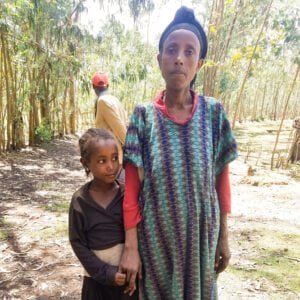-Our Ethiopian preschools provided basic, grassroots education to some of the poorest children in deprived rural communities.
In a culture where child labour is normal and literacy is low, education takes a very low priority. So families remain in a generational cycle of poverty. Our partners, Addis Kidan Baptist Church, provided children with an opportunity to experience the value and power of education, helping communities break the poverty cycle.
“My name is *Paul. I live with my mother and 8 siblings in my family. I joined the preschool when I was 11 years old. Before I had no access to school until the preschool was opened in our area. If there were no such preschool in our areas, I doubt that my family could have sent me to elementary school at all out of my village.
The skills and knowledge I acquired during that time has helped me to be an outstanding student in elementary and high school. Currently, I am attending engineering courses at Asosa University. For future, I have a plan to serve the children in the preschool and help the community with it. I would also like to envision my country to be a better place for children to thrive and succeed.”
What were the challenges?
A largely agricultural culture, children traditionally tended animals and fields. Around 53% of under 14s were engaged in extended labour activities. This was coupled with the low value placed on education. As a result, literacy rates were very low. In a population of 99.5 million, less than half of women could read and write.
Where children did attend a school, many dropped out early. Children from rural villages struggled to cope with primary schooling, where it was offered.
Our work establishing Ethiopian preschools
Our partners, Addis Kidan Baptist Church, tackled deep-rooted poverty in deprived rural communities. They created the preschools to provide children with a basic education, building their capacity and readiness for formal schooling at government primary schools.
We supported five Ethiopian preschools, located in Hosana, Jajura, Sundusa, Selfe and Gombe, over 13 years. As a result, an incredible 6,500 children gained a solid foundation for learning. All the locations are in Ethiopia’s southern Hadiya region, where around 90% of the population live in extremely isolated rural communities.
Children attended pre-school for two years, learning numeracy and literacy. Attendance was high, and many ‘graduates’ went on to government primary schools, therefore enabling more children from poor families to join. The children left the preschools with the skills they needed to succeed in the classroom. And their parents began to value the opportunity education brought to the whole family.
A key part of our support for the preschools was funding the construction of appropriate classrooms. Over 13 years, we helped fund the construction of permanent classrooms in four villages, with properly sited latrines at each site. We also provided clean water sources at four of the preschool sites.
Alongside the preschools, our partners also helped to deliver
– ‘self-help’ groups for parents: micro-finance schemes to save money and develop income-generating projects
– ‘backyard farms’: agricultural initiatives helping families grow improved and more varied crops
– improved health and hygiene: health education and building pit latrines
Becoming Self-Sufficient
Over time, local attitudes to education in these five communities have changed. Education has become more highly valued.
Amarech has been a part of the Jajura community for several years. She was betrothed to her husband when she was a child, so had no opportunity to attend school.
Amarech is grateful that two of her six children could attend the preschool, accessing the opportunities she couldn’t. She says, “I am grateful that this is a benefit for all of us as part of our community. We know that preschool education is very essential for our children before they join elementary school.”
The preschools are now funded by the local community. Global Care’s support is no longer needed.
Looking Ahead
Our relationship with Addis Kidan Baptist Church Welfare and Development Association has been hugely beneficial. Their desire to see vulnerable, marginalized communities holistically transformed, coupled with their local knowledge of the challenges, has made the Ethiopian preschools project a great success.
As our support ends for the preschools, we have now begun a new project with them in Koshe. The Empowerment for Education project challenges the culture which fails to value education and helps develop alternative sources of income for families, so they are less reliant on child labour.
*Children’s names are changed to protect their identities.


 “My name is *Paul. I live with my mother and 8 siblings in my family. I joined the preschool when I was 11 years old. Before I had no access to school until the preschool was opened in our area. If there were no such preschool in our areas, I doubt that my family could have sent me to elementary school at all out of my village.
“My name is *Paul. I live with my mother and 8 siblings in my family. I joined the preschool when I was 11 years old. Before I had no access to school until the preschool was opened in our area. If there were no such preschool in our areas, I doubt that my family could have sent me to elementary school at all out of my village. Amarech has been a part of the Jajura community for several years. She was betrothed to her husband when she was a child, so had no opportunity to attend school.
Amarech has been a part of the Jajura community for several years. She was betrothed to her husband when she was a child, so had no opportunity to attend school.